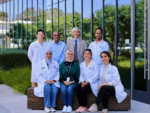News
-
In Memoriam: Dr. Harriet S. Kaplan (1929–2026)
Dr. Harriet Smith Kaplan, a pioneering psychiatrist, devoted physician, beloved mentor, and former investigator at The Lundquist Institute (TLI), passed away peacefully on January 3, 2026, at the age of 96.…
DonorFebruary 24, 2026 -
The Uppuluri Lab Receives NIH R21 Funding to Advance Mucosal Immunity Research in Fungal Infection
The National Institutes of Health (NIH) has awarded Priya Uppuluri, PhD, investigator at The Lundquist Institute, and her team an R21 grant to investigate newly discovered…
ResearchFebruary 20, 2026 -
Researchers identify promising immunotherapy strategy to enhance immune response in pancreatic cancer
Delphine J. Lee, MD, investigator at The Lundquist Institute for Biomedical Innovation, and a team of researchers identified a new immunotherapy strategy that may help overcome one…
ResearchFebruary 19, 2026 -
Taking the Guesswork Out of Rheumatoid Arthritis Treatment
Rheumatoid arthritis (RA) is a long-term autoimmune disease in which the body’s immune system mistakenly attacks the joints. This causes pain, stiffness, swelling, and can lead…
ResearchFebruary 10, 2026 -
Study Identifies Blood Protein Albumin as Key Defense Against Deadly Fungal Infection “Mucormycosis”
A new international study published in Nature has identified albumin, the most abundant protein in human blood, as a powerful and previously unrecognized defense against mucormycosis, a rare but often fatal fungal…
ResearchJanuary 23, 2026 -
The Lundquist Institute for Biomedical Innovation Receives Funding to Strengthen Hospital-Based Violence Prevention Workforce
The Lundquist Institute for Biomedical Innovation was recently awarded funding as part of the Kaiser Permanente Center for Gun Violence Research and Education’s grant to support innovative healthcare-based…
CommunityJanuary 15, 2026 -
Nature Communications Study from The Lundquist Institute Identifies Molecular Mechanism Underlying Peripartum Cardiomyopathy
Scientists at The Lundquist Institute for Biomedical Innovation have identified a previously unknown molecular safeguard that protects the heart during pregnancy, shedding new light on the causes of…
ResearchJanuary 9, 2026 -
Dr. Rajesh K. Garg Recognized for Key Contributions to the 2026 ADA Standards of Care in Diabetes
The American Diabetes Association (ADA) has formally recognized Dr. Rajesh K. Garg, MD, for his important contributions to the 2026 ADA Standards of Care in Diabetes, one of…
ResearchJanuary 7, 2026 -
The Lundquist Institute proudly welcomes Dr. Michelle L. Matter
Michelle L. Matter, PhD joins The Lundquist Institute as an expert in two areas of cardiovascular medicine: cardiomyopathies and sepsis. Underlying these two diseases is a common mechanism that involves cell adhesion…
ResearchJanuary 6, 2026 -
We are delighted to welcome Dr. Santosh Kesari to The Lundquist Institute
Santosh Kesari, MD, PhD joins The Lundquist Institute as an esteemed investigator in Cancer Biology and Immunotherapeutics, bringing exceptional expertise as a board-certified neurologist, oncologist, and clinical trialist. His multidisciplinary research…
ResearchJanuary 5, 2026









